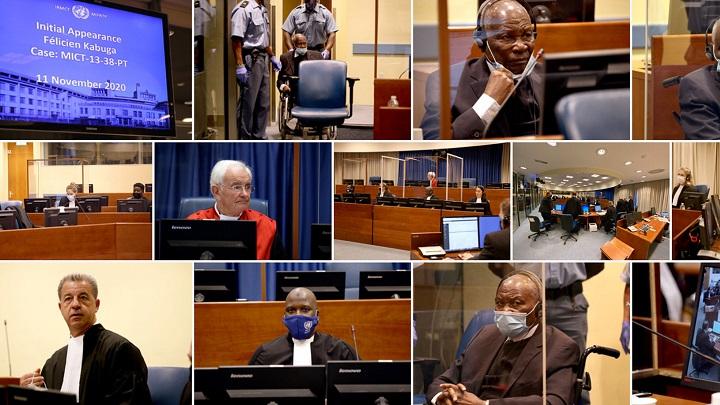Félicien Kabuga appears before the Mechanism for his Initial Appearance

The initial appearance in the case of Prosecutor v. Félicien Kabuga before the International Residual Mechanism for Criminal Tribunals (Mechanism) was held today, Wednesday, 11 November 2020 in The Hague before Judge Iain Bonomy (United Kingdom), the Presiding Judge of the Trial Chamber. Mr. Félicien Kabuga stands charged of seven counts of genocide and crimes against humanity. At the request of Kabuga's Counsel and in accordance with the Mechanism's Rules of Procedure and Evidence, Judge Bonomy entered a plea of not guilty on Kabuga's behalf and indicated that it could be changed at any time.
At the initial appearance, Judge Bonomy ensured that Kabuga – represented by Mr. Emmanuel Altit (France) – was informed of his rights and the charges against him and allowed Kabuga to raise any concerns. The Registrar of the Mechanism, Mr. Abubacarr Tambadou (The Gambia) read out the rights of the accused in the Statute and the full indictment. In addition, Judge Bonomy asked the Prosecution – represented by the Mechanism's Prosecutor, Mr. Serge Brammertz (Belgium) – to streamline the indictment „having regard to the need for both a fair and representative presentation of the Prosecution case and the reality of this particular case that it should commence and conclude as swiftly as possible“. Judge Bonomy also emphasized that this must be done with full regard for the health of Kabuga.
The initial appearance was held exceptionally in The Hague, where Kabuga is undergoing a detailed medical assessment to determine his fitness to travel to the Mechanism's Arusha branch for trial.
Background
Félicien Kabuga was the President of the Comité provisoire of the Fonds de défense nationale (National Defence Fund) from about 25 April 1994 to July 1994 and President of the Comité d’Initiative of Radio Television Libre des Milles Collines (RTLM) during the time of the crimes pleaded in the indictment.
He is charged with genocide, complicity in genocide, direct and public incitement to commit genocide, attempt to commit genocide, conspiracy to commit genocide, and extermination and persecution as crimes against humanity, in respect of the 1994 Genocide against the Tutsi in Rwanda.
Kabuga was first indicted by the International Criminal Tribunal for Rwanda (ICTR) on 26 November 1997, and was arrested near Paris on 16 May 2020, pursuant to a warrant of arrest and an order for transfer issued by the Mechanism. After his arrest, Kabuga contested his extradition before the French courts, and on 30 September 2020, the French Cour de cassation rejected his appeal and authorised his transfer to the Mechanism’s custody.
Following that decision, Kabuga filed an urgent motion on 5 October 2020 requesting, inter alia, that his arrest warrant and order for transfer be amended to provide for his transfer to the Hague branch of the Mechanism rather than the Arusha branch, citing in particular his medical conditions and the health risks associated with travel. Both the Office of the Prosecutor and the Registrar of the Mechanism supported the request for Kabuga to be temporarily transferred to The Hague.
On 21 October 2020, Judge Iain Bonomy amended the arrest warrant and order for transfer to allow for Kabuga’s transfer to the United Nations Detention Unit at the Hague branch of the Mechanism. He was transferred to the Hague branch of the Mechanism on 26 October 2020, after having been at large for more than 22 years.
Kabuga’s case will be heard before a Trial Chamber composed of Judge Iain Bonomy (United Kingdom), Presiding, Judge Graciela Susana Gatti Santana (Uruguay), and Judge Elizabeth Ibanda-Nahamya (Uganda).
The Mechanism was established on 22 December 2010 by the United Nations Security Council to carry out a number of essential functions of the ICTR and the International Criminal Tribunal for the former Yugoslavia, including the trial of fugitives who are among the most senior leaders suspected of being most responsible for crimes that had been under the jurisdiction of these two tribunals.